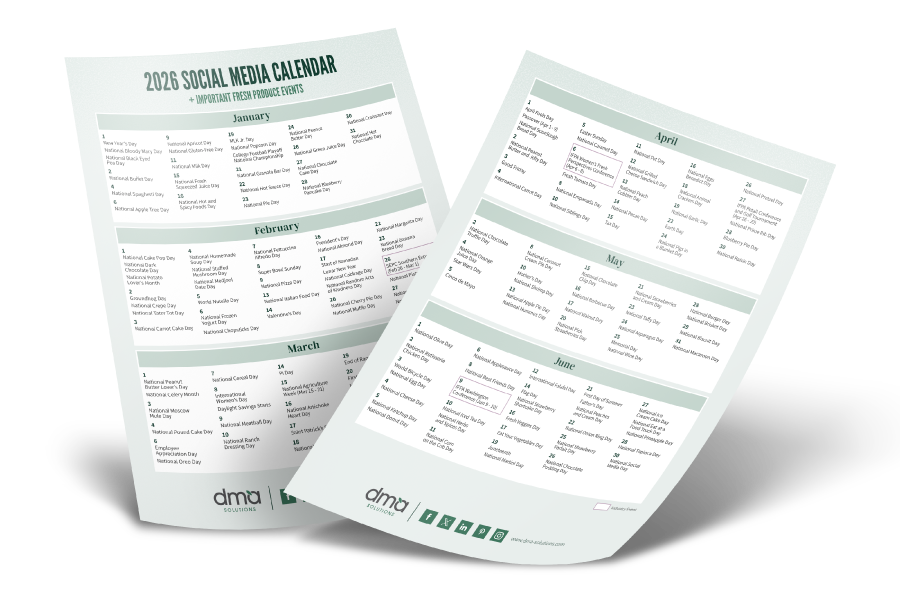If marketing analytics are something you’ve been trying to build a case for, either with yourself or your team, we have seven pros and cons to consider. You can find many similar lists with a quick Google search; however, our list is relevant to the conversations and experiences we’ve had with specific fresh produce clients over the last 18 years. We’ve seen the benefits of the PROS list time and time again when embraced and put into action, and we’ve seen the CONS list create frustrations more than once.
Ultimately, there is only a net positive to marketing analytics. We encourage all marketers to dive in and commit to regular data analysis – if not monthly, then at least quarterly. The insights you will gain can only make your brand and your marketing program stronger.
PROS
1. Insights Into Customer Behaviors and Preferences
With permission-based marketing, you are able to gather extra intel that is like icing on the proverbial marketing analytics cake. You gain a more comprehensive set of data points that you can analyze and leverage to create custom lists that align with your targeting needs. Demographic and lifestyle analytics help you develop very niche audiences that are relevant for certain distributions areas, specific product interests, promotional activities, and more! Analytics help you turn one large customer database into a collection of very customized target lists.
2. Audience Segmenting/Tailored Messaging
Now that you’ve defined interest groups within your audience using analytics, you can deliver tailored communications for a personalized approach. Is a new retailer carrying your product? Inform shoppers in that area using the location data you’ve analyzed. Do you have some new recipes rolling out? Share a link to those resources with shoppers who have expressed interest in that kind of content. Analytics make your marketing efforts more successful when you are meeting a relevant need based on your ability to understand your customers better.
3. Validation/Justification for Budget
Marketing budgets can be a tricky situation at times. It’s not uncommon for the person who holds the purse strings to not be involved in the day-to-day aspects of the marketing program or even understand marketing at all. We recommend using analytics to help set some guardrails and expectations that make the marketing line item less undefined…and maybe less concerning. Marketing can be perceived as a gray area with only theoretical benefits, so when you can show results via marketing analytics each month – the value becomes much more black and white.
4. Sales Support
Not only do analytics make your marketing efforts smarter, but they can support smarter sales efforts too. They can be used to help sales decks tell a richer story. They also provide the sales team with more ways to validate your company as a preferred brand partner. If you have a hungry sales team looking for persuasive talking points, marketing analytics is a great place to start.
CONS
1. Data Paralysis
With good marketing software comes A LOT of data that can feel overwhelming. If you’re considering a transition to data-driven marketing practices, but feel overwhelmed with every report and every dashboard your are looking at, consider taking a step back and identifying 3-4 metrics per marketing activity that you can track. For example, if website analysis is new for you, focus on tracking monthly web visits, page views, and sources. For social media, maybe it’s simply community growth, engagements and web referrals. Start small and as you get comfortable tracking those things, you will begin to see trends or changes that cause you to give it a second look and become interested in a new data point.
2. Data Indifference
Unfortunately, marketers committed to monthly data analysis and reporting are sometimes sharing that information with leadership or other work teams that just don’t seem interested. Don’t let that deter you from maintaining solid data that will help you answer questions down the road and deflect concerns about the plans you have in place. Stay persistent in your own learnings to shape a marketing program that you know is working.
3. Data Requires Analysis and Understanding
If you’re a one-(wo)man show or operate with few resources, it’s entirely possible you have a team full of wonderful, creative minds that just don’t excel with numbers and graphs. Marketing analytics do require certain skills that not all marketers possess. It’s important to assign this responsibility to someone who can get lost in a sea of numbers and come up with valid takeaways that highlight both marketing opportunities and marketing wins.
If you need some guidance as to where to start, give us a call! We can guide you in the process of transitioning to data-driven marketing or help maximize the strategy already in place.
{{cta(’78d3fee5-7e8f-4f2a-b7d6-64eb5db8389f’,’justifycenter’)}}

